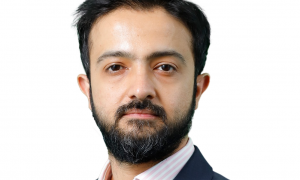This Interview has been published by Pragya Chandni and The SuperLawyer Team

Can you tell us about your journey into the field of law, from your early experiences to your current role as the Founder and Managing Partner of Verum Legal?
My journey into the field of law has been one of personal growth, with a vision to create a lasting impact. It all began with my fascination for justice and the legal system, sparked during my childhood but my formal journey into law started with my undergraduate studies at SLS, Pune. SLS Pune gave me plenty of opportunities and space to grow into a professional, exactly the way I liked, with the right guidance and support, through it all. I, like all other driven law students, did over 12 internships in 5 years – at law firms, with practicing lawyers, NGOs, et al!
After my law school and upon passing the bar exam, I began my career as an associate at an IP firm, believing IP to be my “calling”. While I gained valuable experience at this firm, I had a persistent desire to delve into criminology and criminal laws. This is when I met a stellar female criminal-law advocate – whom I consider a mentor, even today!
However, my entrepreneurial spirit and desire for autonomy led me to establish my own firm, Verum Legal. The vision behind Verum Legal was to create a client-centered practice dedicated to providing personalized legal solutions to upcoming technology-focussed clients – both in the Web2 & Web3 space. As the Founder and Managing Partner, I oversee all aspects of the firm’s operations. From developing client relationships to leading a team of talented attorneys, every day presents new challenges and opportunities.
My journey into the field of law so far, has been a rewarding one, filled with growth, learning, and a deep sense of purpose.
With your extensive experience in both litigation and corporate matters, how do you integrate these two areas to provide practical solutions to your clients?
I honestly believe that, for a lawyer, integrating different skills and experiences is the key aspect of providing comprehensive legal solutions to clients. Choosing on an expertise too soon in one’s career, without exploring opportunities may be detrimental to one’s overall growth.
To become an effective lawyer, the first step is to thoroughly understand the client’s needs and goals and then tailor strategies accordingly. For this, lack of understanding of what is important for a client or how legal solutions today can impact them in the future, can be precarious.
With changing times, a lawyer is also expected to dexterously implement preventive measures to avoid legal disputes, as these disputes can prove to be expensive and tedious for the client.
A lawyer must also understand that despite preventive measures, disputes may still occur and a lawyer with experience in both litigation and corporate matters can prepare clients for potential litigation scenarios effectively.
You’ve worked with several renowned law firms and also in the legal-tech space. How has this diverse experience influenced your approach to legal practice?
I’ve in fact worked with law firms, chamber lawyers and a legal-tech company before I started Verum Legal. I believe that my experiences have provided me with a unique perspective that greatly influences my approach to legal practice.
While my other experiences helped me enhance my legal knowledge, my stint with the legal tech company helped me understand businesses better, helping me provide a more client-centric approach than a traditional legal practice. My experience has been instrumental in providing me with a multi-dimensional approach with better technology exposure, evolved understanding of the market and focussing on client delivery.
As someone deeply involved in advising startups and SMEs on legal and business structuring, what unique challenges do you often encounter in this space?
As an advisor and service provider, I think the most pressing challenge encountered in this space is the obvious one – Startups and SMEs often operate on tight budgets and may not have the financial capacity or inclination to engage legal services. Since seeking legal services also requires the main stakeholders time and efforts, they tend to overlook it, till they are faced with a legal hassle. We pride ourselves on being “startup-friendly” and work on very tight budgets, timelines and innovative perspectives that help new businesses multifolds. We aim to be strategic partners who can provide practical and tailored solutions to address these unique challenges.
Your interest in Legal-Technology is evident from your experience at MyAdvo. How do you see technology shaping the future of legal practice, particularly in areas like arbitration, dispute resolution, and intellectual property rights?
Absolutely, in fact, I consider myself to be a flagbearer of technology, especially in the legal domain. The Legal system, with the myriad issues that it deals with, technology can definitely prove to be increasingly significant in shaping the future of legal practice across various areas. There are sundry applications of technology in the legal space, and it is ever-evolving too. To list a few, I can think of how Online arbitration platforms can allow parties to engage in proceedings remotely and offer secure communication channels, document sharing, and virtual hearings, reducing the need for physical presence and streamlining the arbitration process, while also creating real-time record of the entire process for accountability and precedential value. In fact, Smart contracts, powered by blockchain technology, have immense potential to automate aspects of arbitration and other forms of dispute resolution as well. If executed well, self-executing contracts can automatically enforce agreed-upon terms and trigger arbitration clauses when disputes arise.
In Dispute Resolution, I believe Artificial intelligence can be used to predict case outcomes, assess the likelihood of settlement, and recommend optimal strategies for dispute resolution by analyzing historical case data and legal precedents to provide valuable insights to all parties involved.
For Intellectual Property, AI-driven search tools can quickly scan vast databases to identify prior art, potential infringements, and registration opportunities. In fact, Blockchain technology offers a secure and immutable way to record and protect intellectual property rights. AI tools can monitor IP assets, track deadlines for renewals and filings, and provide insights for strategic IP decision-making.
From your background in handling white-collar crime issues to your expertise in intellectual property rights and data privacy, you’ve covered a wide range of legal domains. What motivates you to continuously expand your expertise across different areas?
I guess I am what they call a “Jack of all trades”. I’ve always been enthusiastic about learning, and doing only work that really interests me. There were times when we picked up assignments that we had, perhaps, never worked on before and learnt most about these assignments, on the job! I would say I’m also blessed to have extremely kind and helpful seniors and colleagues around me who have always lent a helping hand.
I love this about being a lawyer – the world is really your oyster. There are so many options that one can explore – depending on their inclinations, interests, skills – and keep evolving with experience. You never have a dull day, as a lawyer. I think all lawyers ought to be driven by a desire to grow their skill set and advance in their careers. By expanding expertise into new areas, they can broaden their practice, take on diverse cases, and develop a well-rounded understanding of various legal domains. This not only enhances their value to clients but also opens up new opportunities for professional advancement.
Can you share some insights into your role as a Co-Founder of JannAwaaz and how it complements your work at Verum Legal?
JannAwaaz is a project that has always been very close to my heart. JannAwaaz is a social enterprise dedicated to providing legal education, awareness, and assistance to underserved populations, particularly in rural areas. As a Co-Founder of JannAwaaz, my role revolves around leveraging technology to bridge the gap between legal services and accessibility for citizens of India. It’s a platform meant to help Indians raise their voice against all wrongs, violations, breaches and find their rights, using their voice.
Finally, based on your journey and experiences, what advice would you offer to fresh graduates aspiring to pursue a career in law, particularly in corporate and investment transactions?
The only advice I’d give to any aspiring lawyer – don’t decide on your “specialisation” too soon. Experience everything. Technology and the Internet have really changed the game for all young professionals today. You have so much information, available at your fingertips. An individual’s career spans over 40-50 years of their lives, spending around a decade to decide what really interests them, before committing to it, is a fair and required investment! That, and the fact that the legal world has more options and opportunities of careers today than perhaps any other profession does – it is only fair that all of us make the very best of it.
Get in touch with Vasundhara Shanker-























